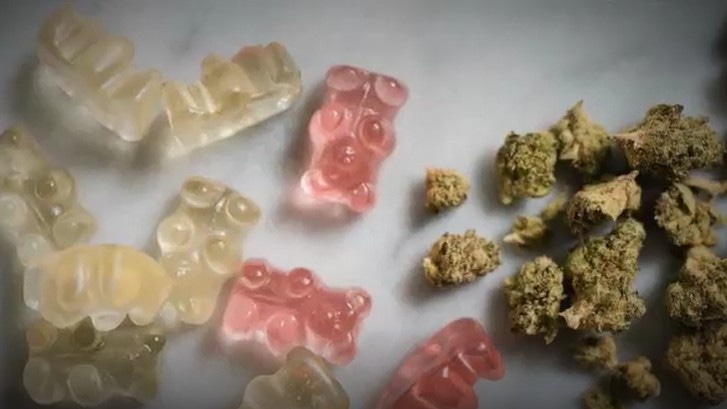Proposed marijuana reform bill would reduce penalty for possession of edibles, vape cartridges
[anvplayer video=”5096960″ station=”998122″]
Minnesota decriminalized small amounts of marijuana leaf or buds back in the 1970s.
Since then, anyone caught with less than an ounce-and-a-half — or 42 grams — gets a ticket for a petty misdemeanor.
But now, in 2022, there is an effort to revise that law.
“The problem is that it did not include any other form of cannabis — any concentrate,” said Rep. Aisha Gomez, DFL-Minneapolis.
Other concentrates are commonly oils or edibles, such as vape cartridges and gummies.

Edible Marijuana (KSTP).
If someone possess any amount of those oils or edibles, it’s a felony in Minnesota.
Rep. Gomez says — nowadays — the concentrates are more popular than the leaf, or buds.
“People are vaping it,” Rep. Gomez said. “They’re eating it via edibles, tinctures and every single amount of cannabis concentrates, any like non-flower product above a quarter gram constitutes a felony.”
Gomez’s proposed bill would decriminalize oils and edibles.
Anything under eight grams of THC, which Rep. Gomez says is the equivalent of an ounce-and-a-half of marijuana leaf— would be a petty misdemeanor and no longer a felony which she says can be debilitating.
“It can make so that you can’t have access to student loans, that you don’t have access to housing and in some cannabis cases your driver’s license can be revoked,” Rep. Gomez said.
Rep. Marion O’Neill, R-Maple Lake, expressed concerns that the weight of the concentrates might hide a much more potent level of THC.
“So, if you’ve got a THC cartridge that is 97-percent THC oil, how much of that — like how do you figure out what’s a small amount of marijuana — that’s what I am struggling with,” Rep. O’Neill said.
Rep. Brian Johnson, R-Cambridge, said studies have shown marijuana — and THC — can have negative health effects on young children and up to age 26.
Defense attorney Tom Gallaghe said past felony convictions for possessing marijuana concentrates could also be reduced or expunged if this proposed decriminalization bill becomes law.
“It’s not a legalization bill,” Gallagher said. “It’s meant to fix or correct something that was meant to be done a long time ago but hasn’t been working very well.